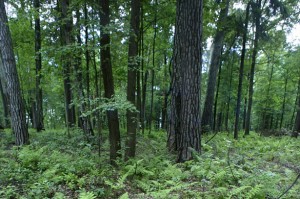“If all human life depends on plants, doesn’t it make sense that perhaps we should try to save them?”
Jonathan Drori
Scientists surely understand. Recent years have seen several large-scale efforts to preserve the genetic diversity of the plants on our planet as it suffers from climate change and habitat loss. For example, two years ago the Norwegians opened the Svalbard Global Seed Vault on Spitzbergen, a place so cold the seeds would remain preserved for weeks even in the absence of power. It has now become the worlds most diverse collection of crop seeds. The rationale and activities of the largest seed bank, the Millenium Seed Bank in England, is described in an informative TED talk: Jonathan Drori: Why we’re storing billions of seeds.
 But the first plant genebank was created in Russia, near St. Petersburg, in 1926. The Pavlovsk Experiment Station contains the world’s first and largest field genebank for fruits and berries. The importance of these fields and the variety of plants grown there is such that during the Seige of Leningrad, the scientists tending the plants decided it was preferable to starve themselves to death rather than eat the plants in their care. Now Pavlovsk is under attack again, this time not by Nazis, but by property developers who plan to destroy the beds and build housing. Unfortunately, the plants and varieties grown there cannot be moved easily and do not grow true from seeds.
But the first plant genebank was created in Russia, near St. Petersburg, in 1926. The Pavlovsk Experiment Station contains the world’s first and largest field genebank for fruits and berries. The importance of these fields and the variety of plants grown there is such that during the Seige of Leningrad, the scientists tending the plants decided it was preferable to starve themselves to death rather than eat the plants in their care. Now Pavlovsk is under attack again, this time not by Nazis, but by property developers who plan to destroy the beds and build housing. Unfortunately, the plants and varieties grown there cannot be moved easily and do not grow true from seeds.
Last Christmas, the Russian Ministry of Economic Development conveyed the land to the Federal Fund for Real Estate Development, despite an appeal by the United Nations Food and Agriculture Organization. So far the Russian government has been tone deaf to protests from scientists and citizens. The question is, will the governmental powers show the courage of their forefathers to view the senseless destruction for what it is and preserve the national genetic heritage for their descendants? The news so far is not promising.
 A similar story has been ongoing outside Moscow, as environmentalists try to save the old growth Khimki forest from developers. Rather than route a new Moscow-Leningrad highway along the old railroad line, developers want to detour through the forest because they can develop the areas beside the road. Never mind that the forest is a protected area with high biodiversity.
A similar story has been ongoing outside Moscow, as environmentalists try to save the old growth Khimki forest from developers. Rather than route a new Moscow-Leningrad highway along the old railroad line, developers want to detour through the forest because they can develop the areas beside the road. Never mind that the forest is a protected area with high biodiversity.
The forest also helps reduce the “urban heat island” effect present in major cities, which can raise the temperature as much as 20 degrees Fahrenheit over surrounding areas. The average Muscovite does not have to be reminded of what is at stake, as they swelter through an unprecedented heat wave and suffer smoke from fires in surrounding areas. Perhaps the environmental cost will prompt the European Bank for Reconstruction and Development, which is providing construction credits, to drop its support for the project.
But the question here is the the same as with Pavlovsk: Are those in power really free to destroy the people’s environmental heritage for no reason other than to line the pockets of the wealthy? Even our city life is still closely dependent on Nature. Let us find a way to live as gently as we can on this Earth, cherishing our plant life just as we cherish our own. If that means that the rich must find some non-destructive way to make their millions, then so be it.

It is important that these things get maximum publicity, especially in Europe. Generally, bad publicity is more effective with the Russian authorities than protests by foreign governments. Let’s hope others pick this up, both in Europe and in Russia.
President Medvedev at one point last year suspended work on the road through Khimki forest, but then it was resumed in December. But opposition continues, as reported in the following account:
Russia Profile
March 1, 2011
Veni, Vinci, Von!
The Battle for Khimki Forest Is Coming Alive Again if Renewed Administrative Pressure on Their Leaders Is Any Gauge, Say Activists
By Tom Balmforth
As ecological activist leaders claim that Russian authorities are threatening to take away their children, environmentalists on Tuesday stepped up their opposition to construction of a highway through prize woodland outside Moscow, with a public protest in the capital. Around forty activists of the “Khimki Forest Defenders” movement gathered at Chistiye Prudy before walking to Vinci, the French construction company currently contracted to build the controversial highway from Moscow to St. Petersburg. The Vinci offices, however, have moved place.
Many thought the grassroots movement to stop the felling of Khimki Forest north-west of Moscow was falling from the heights of media attention that it reached last year.
Back in July 2010, President Dmitry Medvedev’s decision to impose a moratorium on the road’s construction for an investigation was seen as a rare victory for Russian civil society, so often seen as weak. When journalist Oleg Kashin, who covered the conflict for Kommersant daily, was brutally beaten in November, the movement won widespread coverage in the media.
That was until December, when Medvedev unceremoniously gave the project the go-ahead.
But the activists pledged to continue their struggle. “The Khimki Forest is definitely not lost and we will continue to fight for it. What Medvedev said about the construction recommencing ¬ for the majority of those here it is illegal. The project is completely illegal,” said Yaroslav Nikitenko, deputy head of the Khimki Forest Defenders.
And the latest bout of administrative pressure being levied on the Khimki activists is testament to the success of their continued opposition to the highway, the activists claim.
On February 21, Chirikova thought nothing more of it when she did not answer the door to her apartment. Later a neighbor came to her and explained that the local Child Welfare Services had called on them in connection with a complaint that Chirikova was being a bad mother to her children, four and nine.
Outraged, the fiery ex Moscow businesswoman and mother of two, called the Child Welfare Services and filmed the phone call in a video now widely circulating on Russia’s blogosphere since it was posted on the movement’s Web site.
The Child Welfare Services told Chirikova, 33, that they are obliged to follow up the complaint with an inspection of Chirikova’s apartment in order to submit a report to the police. In a tweeted message on Saturday, Chirikova said the police rang at their apartment door in connection with the child abuse claims, although her husband refused to let them in.
“Everything used to be completely normal. Now there is the woe that the police are trying to take Yevgenia Chirikova’s children away from her,” said Nikitenko.
“We have realized that we are being effective in our protest now that opposition to us has begun again,” Chirikova said at the rally at Chistiye Prudy. “On February 1, they broke up our rally by planting a fake bomb at it. And then ten days later Chernysheva was detained along with her children allegedly for doing this,” said Chirikova.
On February 10, the editor of the activist pamphlet “Khimki Pravda is Alive,” Alla Chernysheva, was detained along with her children after she was accused of planting an imitation bomb at a rally that she helped organize. Her children were held for four and half hours. Chernysheva told Russia Profile that she was denied access to a phone in order to call her relatives to pick up her children. She was also asked to sign a confession, she said.
The activists say they are trying to make as much noise in their opposition as possible, writing letters to a raft of non-governmental organizations, now including those which deal with child rights. Russia’s Child Ombudsman Pavel Astakhov on Friday condemned the pressure on her through the child welfare services as “foul, illegal and unacceptable,” Gazeta.Ru reports. They also wrote letters to European Commission President Jose Manuel Barroso timed to coincide with his meeting with Premier Vladimir Putin last Thursday.
In their latest strategy, the activists are trying to put pressure directly on Vinci, the French construction company contracted to build the road. They are appealing to Vinci’s president, Xavier Huillard, in an open letter published on the front page of their newspaper, “The Khimkinskaya Pravda is Alive,” which carries the headline “Vinci, Clear Off!” (Vinci, Vyidi Von!” Since Thursday they tried to distribute 15,000 copies in time for the protest. They had planned to submit an appeal letter to Vinci publically, although when they arrived at Vinci’s old offices this afternoon, it turned out that they have moved, Nikitenko said.
“Clearly, Vinci are not up to speed with this project. If they really understood what is going on, then they would have left ages ago and stopped taking part in this corrupt project,” said Chirikova.
Members of the opposition from the Just Russia and Liberal Democratic Party of Russia (LDPR) parties tried to score political points by attending the rally. Dmitry Gudkov of Just Russia called on the protestors not to give up their fight, arguing that it inspired civil society across the country.
“There is something called the Khimki Forest effect,” Gudkov told the protestors. “I know a lot of rights workers in the regions who after the Russian president halted the project were overjoyed. They said: ‘look our bureaucrats are actually thinking instead of carving up our money and our woodland between them.” He called on them to keep up their opposition, which has been an example to other nascent grassroots movements across the country.